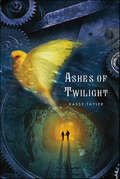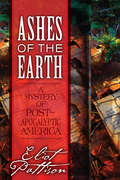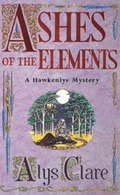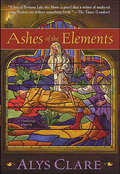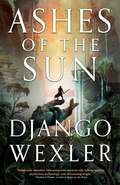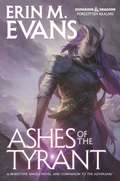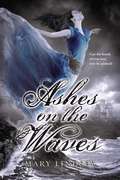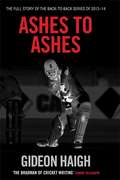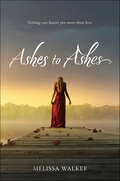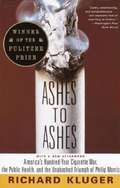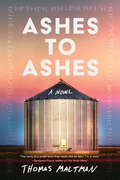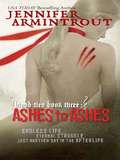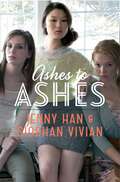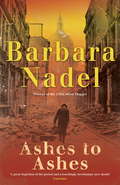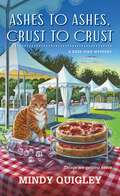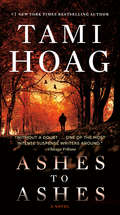- Table View
- List View
Ashes of Twilight (Ashes of Twilight Trilogy)
by Kassy TaylerWren MacAvoy works as a coal miner for a domed city that was constructed in the mid-nineteenth century to protect the royal blood line of England when astronomers spotted a comet on a collision course with Earth. Humanity would be saved by the most groundbreaking technology of the time. But after nearly 200 years of life beneath the dome, society has become complacent and the coal is running out. Plus there are those who wonder, is there life outside the dome or is the world still consumed by fire? When one of Wren's friends escapes the confines of the dome, he is burned alive and put on display as a warning to those seeking to disrupt the dome's way of life. But Alex's final words are haunting. "The sky is blue." What happens next is a whirlwind of adventure, romance, conspiracy and the struggle to stay alive in a world where nothing is as it seems. Wren unwittingly becomes a catalyst for a revolution that destroys the dome and the only way to survive might be to embrace what the entire society has feared their entire existence.Ashes of Twilight is the first book in a trilogy by Kassy Tayler.
Ashes of a Black Frost
by Chris EvansAmidst a sea of carnage on a desert battlefield blanketed in metallic snow, Major Konowa Swift Dragon sees his future, and it is one drenched in shadow and blood. Never mind that he has won a grand victory for the Calahrian Empire; he has failed in the search for his lost regiment of elves. But Konowa knows, as do the Iron Elves, that a far more important battle looms on the twisted, darkening path to the Hyntaland—the final confrontation with the dreaded Shadow Monarch. Konowa’s ultimate journey is fraught with escalating danger: monstrous creatures spawned from a vast, black forest; the Shadow Monarch’s vengeful and maniacally unstable former emissary; reluctant hero Private Alwyn Renwar, who struggles to maintain his connection between the living and the dead; and Konowa’s former love, Visyna Tekoy, who is fighting for her life against the very elves he so desperately wants to find. And so Konowa sets off to pursue his freedom from a curse that has cast his life in darkness. For though his long, violent trek may indeed lead him to his destiny, he is ill-prepared for the discovery he will make . . . with the fate of the Iron Elves, and the world, hinging on the courage of one wrathful elf.
Ashes of a Black Frost: Book Three of The Iron Elves
by Chris EvansBones jutted from the sand at angles--not odd angles, though, for that would suggest that there were ways bones could protrude that made sense--and the eyes of those still living stared and saw nothing. Amidst a scene of carnage on a desert battlefield blanketed in metallic snow, Major Konowa Swift Dragon sees his future, and it is one drenched in shadow and blood. Never mind that he has won a grand victory for the Calahrian Empire. He came here in search of his lost regiment of elves, while the Imperial Prince came looking for the treasures of a mystical library, and both ventures have failed. But Konowa knows, as do the Iron Elves--both living and dead--that another, far more important battle now looms before them. The campaign in the desert was only the latest obstacle on the twisted, darkening path leading inexorably to the Hyntaland, and the final confrontation with the dreaded Shadow Monarch. In this third novel of musket and magic in Chris Evans's Iron Elves saga, Konowa's ultimate journey is fraught with escalating danger. A vast, black forest finds a new source of dark power, spawning creatures even more monstrous than the blood trees from which they evolve. The maniacally unstable former emissary of the Shadow Monarch hungers for revenge, leading an army of ravenous beasts bent on utterly destroying the Iron Elves. A reluctant hero, Private Alwyn Renwar, struggles to maintain his connection to this world and that of the loyalty of the shades of the dead. And in a maze of underground tunnels, Visyna Tekoy, whom Konowa counts among those he has loved and lost, fights for her life against the very elves he so desperately wants to find. And so Konowa sets off from this Canyon of Bones, pursuing his freedom from a curse that has cast his life in darkness. For though his long, violent trek may indeed lead him to his destiny, he is ill prepared for the discovery he will make . . . with the fate of the Iron Elves, and the world, hinging on the courage of one wrathful elf.
Ashes of the Earth: A Mystery of Post-Apocalyptic America
by Eliot PattisonThirty years after global holocaust, the colony of Carthage still struggles to build its new world. While steam engines and other early industrial technology have empowered its economy, the fragile society is undermined by secret crimes, rifts between generations, government censorship, and a legacy of casting out those who suffer from radiation sickness.Embittered survivor Hadrian Boone-once a revered colony founder-has been hounded by despair and the ghosts of his past into a life of drunkenness and frequent imprisonment for challenging the governor's tyranny. But when a gentle old man, the colony's leading scientist, is murdered, Hadrian glimpses chilling secrets behind the killing that could destroy the colony. Realizing that he may be the only one able to expose the truth, Hadrian begins a desperate quest through the underbelly of the colony into the wrenching camps of the outcasts, escorted by a young policewoman who struggles to cope with the physical and emotional remnants of the prior world. Ultimately Hadrian's journey becomes one of self-discovery, and to find justice his greatest challenge is navigating the tortuous path of the human spirit in a world that has been forever fractured.
Ashes of the Elements
by Alys ClareA grove of huge oak trees in the Wealden forest is felled. And, as if some ancient curse is being brought alive, the man who wielded the axes meets with a violent end.The Sheriff claims the Forest People did it, but Abbess Helewise believes a supernatural solution is too easy an answer. She consults Josse d'Acquin, whose manor house in the Weald is now being renovated, and he, concerned about the safety of two girls from the abbey, enters the forest himself - to find something in this ancient part of Britain that terrifies even him.
Ashes of the Elements (Hawkenlye Medieval Mystery)
by Alys ClareIn this, Book II of the Hawkenlye Trilogy, the Abbess Helewise takes on another strange case with her French partner, Josse d'Acquin. A lumberjack in the Wealken forest has been found dead. The locals would have it that the mythical Forest People are to blame for his violent end. But when the Abbess Helewise steps in to investigate, she thinks a supernatural solution too easy an answer. She consults her friend Josse d'Acquin, a French soldier of fortune who has helped her many a time. He, concerned about the safety of the abbey, ventures into the forest himself, only to find in this so-called haunted wood something that terrifies even him. Now the two must reconcile superstition with their better judgement.
Ashes of the Elements (Hawkenlye Mysteries #2)
by Alys ClareIn this, Book II of the Hawkenlye Trilogy, the Abbess Helewise takes on another strange case with her French partner, Josse d'Acquin. A lumberjack in the Wealken forest has been found dead. The locals would have it that the mythical Forest People are to blame for his violent end. But when the Abbess Helewise steps in to investigate, she thinks a supernatural solution too easy an answer. She consults her friend Josse d'Acquin, a French soldier of fortune who has helped her many a time. He, concerned about the safety of the abbey, ventures into the forest himself, only to find in this so-called haunted wood something that terrifies even him. Now the two must reconcile superstition with their better judgement.
Ashes of the Elements (Hawkenlye Mystery Trilogy Ser. #2)
by Alys ClareA grove of huge oak trees in the Wealden forest is felled. And, as if some ancient curse is being brought alive, the man who wielded the axes meets with a violent end.The Sheriff claims the Forest People did it, but Abbess Helewise believes a supernatural solution is too easy an answer. She consults Josse d'Acquin, whose manor house in the Weald is now being renovated, and he, concerned about the safety of two girls from the abbey, enters the forest himself - to find something in this ancient part of Britain that terrifies even him.
Ashes of the Sun (Burningblade & Silvereye #1)
by Django Wexler"Ashes of the Sun is fantasy at its finest"--Nicholas Eames, author of Kings of the WyldLong ago, a magical war destroyed an empire, and a new one was built in its ashes. But still the old grudges simmer, and two siblings will fight on opposite sides to save their world in the start of Django Wexler's new epic fantasy trilogy.Gyre hasn't seen his beloved sister since their parents sold her to the mysterious Twilight Order. Now, twelve years after her disappearance, Gyre's sole focus is revenge, and he's willing to risk anything and anyone to claim enough power to destroy the Order. Chasing rumors of a fabled city protecting a powerful artifact, Gyre comes face-to-face with his lost sister. But she isn't who she once was. Trained to be a warrior, Maya wields magic for the Twilight Order's cause. Standing on opposite sides of a looming civil war, the two siblings will learn that not even the ties of blood will keep them from splitting the world in two.
Ashes of the Tyrant
by Erin M. EvansIn a direct follow-up to her fourth book in the Brimstone Angels series, Fire in the Blood, Erin M. Evans thrusts her signature character Farideh into a fast-paced murder mystery rife with political intrigue. In the wake of the war brought on by the Sundering, Farideh's adopted father Mehen has been called back by the clan that cast him out, and Farideh and Havilar mean to go with him. Just as Mehen confronts the head of his former clan, a clutch of young dragonborn is found in the catacombs, brutally murdered, an infernal summoning circle that looks all-too-familiar to Farideh, nearby.
Ashes on the Waves
by Mary LindseyA sexy gothic romance based on Edgar Allan Poe's "Annabel Lee" Liam MacGregor is cursed. Haunted by the wails of fantastical Bean Sidhes and labeled a demon by the villagers of Dòchas, Liam has accepted that things will never get better for him-until a wealthy heiress named Annabel Leighton arrives on the island and Liam’s fate is changed forever. With Anna, Liam finally finds the happiness he has always been denied, but the violent, mythical Otherworlders, who inhabit the island and the sea around it, have other plans. They make a wager on the couple’s love, testing its strength through a series of cruel obstacles. But the tragedies draw Liam and Anna even closer. Frustrated, the creatures put the couple through one last trial-and this time it’s not only their love that’s in danger of being destroyed. Based on Edgar Allan Poe’s chilling poem Annabel Lee, with references to many of his other poems including The Raven, Mary Lindsey creates a frighteningly beautiful gothic novel that glorifies the power of true love. Perfect for fans of Lauren Kate's Fallen series, Kendra Blake's Anna Dressed in Blood, and Kelly Creagh's Nevermore. Praise for Ashes on the Waves "Achingly beautiful and darkly sensuous . . . an extraordinary read that left me breathless at every turn!” -Sophie Jordan, New York Times bestselling author of Firelight "Mary Lindsey, inspired by Edgar Allan Poe, has created a haunting, mystical world. I loved this tragic, romantic story. ” -Cate Tiernan, author of Sweep and Immortal Beloved .
Ashes to Ashes
by Gideon HaighFor the first time since the mid-1970s, England and Australia faced each other home and away in back-to-back series in the summer and winter of 2013. Under prolific captain Alastair Cook, England went into the Ashes on the back of three unbeaten series, including a first win in India for more than 25 years. By contrast, Michael Clarke's Australia arrived in England with an inexperienced side, changing their coach just weeks before the Ashes started. No wonder England started as strong favourites. And so it proved, as England won the home series by a 3-0 margin - their biggest Ashes win since the 1970s. But there were signs of an Australian revival in their defeat, and when England arrived Down Under, they found an entire nation ready to make things different, as the underdogs fought back. Suddenly, Australia were the better side in every aspect of the game, and they won back the Ashes after three consecutive crushing victories. Watching on as events unfolded was award-winning cricket writer Gideon Haigh. With great insight and skill, he reveals the key moments of both series, analysing the personalities of the players and how they coped with the most pressurised and high-profile cricketing contest of them all: the Ashes. No other book on the subject comes close to this one in getting to the heart of the matter.
Ashes to Ashes
by Jenny Han Siobhan VivianNew Year's Eve ended with a bang and Mary, Kat and Lillia may not be prepared for what is to come.After Rennie's death, Kat and Lillia try to put the pieces together of what happened to her. They both blame themselves. If Lillia hadn't left with Reeve... If Kat had only stayed with Rennie... Things could have been different. Now they will never be the same.Only Mary knows the truth about that night. About what she is. She also knows the truth about Lillia and Reeve falling in love, about Reeve being happy when all he deserves is misery, just like the misery he caused her. Now their childish attempts at revenge are a thing of the past and Mary is out for blood. Will she leave anything in her wake or will all that remain be ashes?
Ashes to Ashes
by Melissa WalkerA timeless and romantic ghost story that will haunt readers long after the last page is turned.When Callie's life is cut short by a tragic accident in her hometown of Charleston, South Carolina, her spirit travels to another dimension called the Prism. Here she meets a striking and mysterious ghost named Thatcher, who guides her as she learns how to bring peace to those she left behind. But Callie soon uncovers a dark secret about the spirit world: some of the souls in it are angry, and they desperately want revenge. These souls are willing to do whatever it takes to stay on Earth, threatening the existence of everyone she ever cared about.Perfect for fans of Gayle Forman's If I Stay and Lauren Oliver's Before I Fall, this thoughtful and suspenseful novel will have readers eager to read the sequel, Dust to Dust.
Ashes to Ashes
by Richard KlugerNo book before this one has rendered the story of cigarettes -- mankind's most common self-destructive instrument and its most profitable consumer product -- with such sweep and enlivening detail.Here for the first time, in a story full of the complexities and contradictions of human nature, all the strands of the historical process -- financial, social, psychological, medical, political, and legal -- are woven together in a riveting narrative. The key characters are the top corporate executives, public health investigators, and antismoking activists who have clashed ever more stridently as Americans debate whether smoking should be closely regulated as a major health menace.We see tobacco spread rapidly from its aboriginal sources in the New World 500 years ago, as it becomes increasingly viewed by some as sinful and some as alluring, and by government as a windfall source of tax revenue. With the arrival of the cigarette in the late-nineteenth century, smoking changes from a luxury and occasional pastime to an everyday -- to some, indispensable -- habit, aided markedly by the exuberance of the tobacco huskers.This free-enterprise success saga grows shadowed, from the middle of this century, as science begins to understand the cigarette's toxicity. Ironically the more detailed and persuasive the findings by medical investigators, the more cigarette makers prosper by seeming to modify their product with filters and reduced dosages of tar and nicotine.We see the tobacco manufacturers come under intensifying assault as a rogue industry for knowingly and callously plying their hazardous wares while insisting that the health charges against them (a) remain unproven, and (b) are universally understood, so smokers indulge at their own risk.Among the eye-opening disclosures here: outrageous pseudo-scientific claims made for cigarettes throughout the '30s and '40s, and the story of how the tobacco industry and the National Cancer Institute spent millions to develop a "safer" cigarette that was never brought to market.Dealing with an emotional subject that has generated more heat than light, this book is a dispassionate tour de force that examines the nature of the companies' culpability, the complicity of society as a whole, and the shaky moral ground claimed by smokers who are now demanding recompenseFrom the Trade Paperback edition.
Ashes to Ashes
by Thomas MaltmanSmall-town Minnesota teenager Basil &“The Brute&” Thorson—a shy, reluctant wrestling star and &“special&” tracked into special education classes—vows to make his family whole again in the wake of multiple tragedies, during a year in which his community is roiled by strange religious and mythological events.Another perceptive and empathetic novel from the author of Indie Next and All Iowa Reads selection Little Wolves, blending myth, history, and religion with a nuanced look at contemporary rural life, perfect for fans of Marilynne Robinson, Richard Russo, and Paul Harding.When the ashes from an Ash Wednesday service in the prairie town of Andwhen, Minnesota, refuse to wash off, members of a small congregation are left wondering whether they&’ve been blessed or cursed. For Basil—a &“gentle giant&” of a teen reeling from a farming accident that shattered his family and haunted by his mother&’s decade-long confinement in a state mental hospital—the ashes become a sign. He embarks on a secret ritual of fasting and prayer, seeking meaning in his unraveling world.Meanwhile, Basil and his friends, Lukas and Morgan (who self-identify as &“a gay, a goth, and a giant&”), stumble upon what may be the centuries-old remains of a Viking explorer in a local meadow, a find that brings its own complications, as folk history clashes with the agendas of online racists. As Basil&’s relentless fasting warps his grip on reality, the danger he poses to himself and his family escalates.Blending the fragments of a Norse saga with a finely observed portrait of rural Midwestern life at the start of the pandemic, Thomas Maltman delivers a novel of narrative daring and profound empathy—his most inventive and compassionate work yet.
Ashes to Ashes (Blood Ties #3)
by Jennifer ArmintroutBeing a vampire is a life-or-death situation. When I was first turned, I had only my survival to worry about. Now I'm locked in a battle for the existence of the entire human race-and the cards are definitely stacked against me. The Voluntary Vampire Extinction Movement headquarters are destroyed, and their pet horror, the Oracle, is on the loose. She'll stop at nothing to turn the world into a vampire's paradise, even if it means helping the Soul Eater become a god and harnessing his power for her own evil ends. An ancient vampire, a blood-sucking near deity and oh, yeah, my presently human former sire thrown into the mix. I say bring it on. May the best monster win.
Ashes to Ashes (Burn for Burn #3)
by Jenny Han Siobhan VivianThink Mary, Kat, and Lillia have nothing left to lose? Think again. The fiery conclusion to the Burn for Burn trilogy from New York Times bestselling author Jenny Han and Siobhan Vivian.<P> They only meant to right the wrongs. It was about getting even. Burn for burn.<P> But the fire they lit kept raging…Reeve ended up hurt, then Rennie ended up dead.<P> Everything will turn to ash if they don’t stop what they started. But now that Mary knows the truth about what happened to her, will she want to?<P> Secrets drew Lillia, Kat, and Mary together. The truth might tear them apart.
Ashes to Ashes (Experiment in Terror #12)
by Karina HalleThey are each other's anchors . . . and the storm is far from over. It's been two months since Perry Palomino and Dex Foray's relationship reached a new turning point, two months since Perry started a new life in Seattle, and two months since their Experiment in Terror show took on a new partner, ex-Wine Babe Rebecca Sims, and a newfound level of success. But whenever there is light in their lives, the madness still has a way of coming back in.When the team is sent back to the stormy Oregon coast to investigate a haunted school, Perry wants to use the opportunity to reconnect with her family and reintroduce Dex into their lives. Only Perry's not the only one who's reaching out - her grandmother Pippa has started appearing to her with disturbing warnings and Perry's presence at the school has ignited a chilling new wave of supernatural phenomenon. Once used a century ago as a sanatorium to house children dying of tuberculosis, the school's past residents are slowly coming back to life and with one thing on their mind: They want someone to play with, someone to join them. Forever.Even when dead, some children get whatever they want.And they want Perry.
Ashes to Ashes (Francis Hancock Mystery 3): A page-turning World War Two crime thriller
by Barbara NadelAs London burns, an unlikely hero unearths a series of brutal murders...Ashes to Ashes is the third novel in the acclaimed Francis Hancock World War Two crime series by Barbara Nadel. Perfect for fans of Martin Walker and Maureen Jennings. 'A great depiction of the period and a touchingly involuntary new sleuth' - Guardian As the German Luftwaffe bomb the capital, undertaker Francis Hancock suddenly finds himself caught up in the middle of a terrifying abduction plot.It's 29 December, 1940, the night that Hitler has chosen to destroy London under a barrage of flaming incendiary bombs. Their main target - St Paul's cathedral - is where Hancock is sheltering from the onslaught. But the First World War veteran doesn't just have bombs to contend with; a young girl, who was also sheltering in the cathedral, has vanished. Then some of those charged with protecting the building are brutally murdered. Hancock must face his own demons and fears in his struggle to catch those responsible and bring them to justice...What readers are saying about Ashes to Ashes:'The details of people's ordinary lives adds so much depth to the story''The tale covers madness, loyalty, patriotism, priorities, faith - all the deep stuff Barbara Nadel tackles so well''Barbara Nadel is a seriously perceptive, interesting writer'
Ashes to Ashes, Crust to Crust: A Deep Dish Mystery (Deep Dish Mysteries #2)
by Mindy QuigleyAshes to Ashes, Crust to Crust is the second book in Mindy Quigley's delectable Deep Dish Mystery series, set in a Wisconsin pizzeria.Newly single pizzeria owner Delilah O’Leary is determined to keep her restaurant afloat in the picturesque resort town of Geneva Bay, Wisconsin. To boost her bottom line, she sets her sights on winning the hefty cash prize in the town’s annual “Taste of Wisconsin” culinary contest. In her corner, she’s got her strong-willed, “big-boned” cat Butterball, her wisecracking BFF, her cantankerous great-aunt, and a nearly-flawless recipe for Pretzel Crust Deep-Dish Bratwurst Pizza. But while Delilah and her team have been focused on pumping out perfect pizza pies, her ex-fiancé has cozied up to a new squeeze, juice bar owner Jordan Watts—Delilah’s contest rival.When one of Jordan’s juice bar customers is poisoned by a tainted smoothie, Delilah lands deep in the sauce. Accusations fly, suspects abound, and a menacing stranger turns up with a beef over some missing dough. Between kale-juicing hipsters and grudge-bearing celebrity chefs, Delilah must act quickly before another one bites the crust.
Ashes to Ashes: A Novel (Kovac / Liska #1)
by Tami Hoag"Without a doubt . . . one of the most intense suspense writers around."--Chicago Tribune "[Tami Hoag] demonstrates just why she has become one of the hottest names in the suspense game. Bottom line: Leaves competition in the dust."--People He performs his profane ceremony in a wooded Minneapolis park, anointing his victims, then setting the bodies ablaze. He has already claimed three lives, and he won't stop there. Only this time there is a witness. But she isn't talking. Enter Kate Conlan, former FBI agent turned victim/witness advocate. Not even she can tell if the reluctant witness is a potential victim or something more troubling still. Her superiors are interested only because the latest victim may be the daughter of Peter Bondurant, an enigmatic billionaire. When Peter pulls strings, Special Agent John Quinn gets assigned to the case. But the FBI's ace profiler of serial killers is the last person Kate wants to work with, not with their troubled history. Now she faces the most difficult role of her career--and her life. For she's the only woman who has what it takes to stop the killer . . . and the one woman he wants next. "You'll want to lock the doors while you're reading."--Minneapolis Star Tribune "An up-all-night read."--The Detroit NewsFrom the Paperback edition.
Ashes to Ashes: A page-turning World War Two crime thriller (Francis Hancock Mystery #3)
by Barbara NadelAs London burns, an unlikely hero unearths a series of brutal murders...Ashes to Ashes is the third novel in the acclaimed Francis Hancock World War Two crime series by Barbara Nadel. Perfect for fans of Martin Walker and Maureen Jennings. 'A great depiction of the period and a touchingly involuntary new sleuth' - Guardian As the German Luftwaffe bomb the capital, undertaker Francis Hancock suddenly finds himself caught up in the middle of a terrifying abduction plot.It's 29 December, 1940, the night that Hitler has chosen to destroy London under a barrage of flaming incendiary bombs. Their main target - St Paul's cathedral - is where Hancock is sheltering from the onslaught. But the First World War veteran doesn't just have bombs to contend with; a young girl, who was also sheltering in the cathedral, has vanished. Then some of those charged with protecting the building are brutally murdered. Hancock must face his own demons and fears in his struggle to catch those responsible and bring them to justice...What readers are saying about Ashes to Ashes:'The details of people's ordinary lives adds so much depth to the story''The tale covers madness, loyalty, patriotism, priorities, faith - all the deep stuff Barbara Nadel tackles so well''Barbara Nadel is a seriously perceptive, interesting writer'
Ashes to Ashes: America's Hundred-Year Cigarette War, the Public Health, and the Unabashed Triumph of Philip Morris
by Richard KlugerNo book before this one has rendered the story of cigarettes -- mankind's most common self-destructive instrument and its most profitable consumer product -- with such sweep and enlivening detail. Here for the first time, in a story full of the complexities and contradictions of human nature, all the strands of the historical process -- financial, social, psychological, medical, political, and legal -- are woven together in a riveting narrative. The key characters are the top corporate executives, public health investigators, and antismoking activists who have clashed ever more stridently as Americans debate whether smoking should be closely regulated as a major health menace. We see tobacco spread rapidly from its aboriginal sources in the New World 500 years ago, as it becomes increasingly viewed by some as sinful and some as alluring, and by government as a windfall source of tax revenue. With the arrival of the cigarette in the late-nineteenth century, smoking changes from a luxury and occasional pastime to an everyday -- to some, indispensable -- habit, aided markedly by the exuberance of the tobacco huskers. This free-enterprise success saga grows shadowed, from the middle of this century, as science begins to understand the cigarette's toxicity. Ironically the more detailed and persuasive the findings by medical investigators, the more cigarette makers prosper by seeming to modify their product with filters and reduced dosages of tar and nicotine. We see the tobacco manufacturers come under intensifying assault as a rogue industry for knowingly and callously plying their hazardous wares while insisting that the health charges against them (a) remain unproven, and (b) are universally understood, so smokers indulge at their own risk. Among the eye-opening disclosures here: outrageous pseudo-scientific claims made for cigarettes throughout the '30s and '40s, and the story of how the tobacco industry and the National Cancer Institute spent millions to develop a "safer" cigarette that was never brought to market. Dealing with an emotional subject that has generated more heat than light, this book is a dispassionate tour de force that examines the nature of the companies' culpability, the complicity of society as a whole, and the shaky moral ground claimed by smokers who are now demanding recompense.
